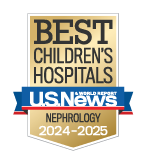Bone and Mineral Health Clinic
Nationally ranked by U.S. News & World Report

Bone disorders in children
Children with all types of genetic and acquired bone disorders are evaluated and treated in Bone and Mineral Health Clinic. We also see referrals for the investigation and treatment of children with kidney stones and abnormalities in the mineral metabolism.
We perform most of the laboratory work on site in our Nephrology Research Lab to ensure timely and accurate results. Pediatric bone densitometry is available as a diagnostic tool, and the clinic provide intravenous bisphosphonate infusion therapy on an outpatient basis.
Children's Mercy has an outstanding program that treats a wide range of conditions including primary osteoporosis and all types of genetic and acquired bone disorders. The team has been treating a growing number of children with secondary osteoporosis from chronic diseases such as cystic fibrosis, Crohn's disease, malignancies, neurologic disorders, etc., in whom bone health is compromised by either the primary condition or its long-term therapy.
Bone disorders can be caused by genetic disorders, such as osteogenesis imperfecta, sometimes called "brittle bone disease." At Children's Mercy, a regional center for this disease, the goals are to limit the adverse effects of the disease on bone development to the extent possible, to eliminate or minimize the occurrence of fractures, and with this to improve the quality of life of these children.
Kidney stones in children
Cases of kidney stones in children have increased significantly in recent years, raising concerns among health care providers. Drs. Uri Alon and Tarak Srivastava have developed a new laboratory test named urinary calcium/citrate ratio, which provides a better tool for the diagnosis and treatment of children with kidney stones. Their research has led them to believe that education is key to preventing kidney stones in children. Since better nutrition has been shown to have a very positive effect on children who develop kidney stones, the team at Children's Mercy Hospital works with families to encourage them to reduce salt intake and eat more fruits and vegetables. This not only reduces children's risk of developing additional kidney stones, it improves their overall health.
Evaluation and treatment
A key aspect of the successful evaluation and management of pediatric bone disorders is densitometry, a radiologic procedure that measures bone density. Children's Mercy Hospital is the only institution in the area to offer pediatric bone densitometry, allowing clinicians to quantitatively assess bone density in children.
For children identified with low bone density, intravenous bisphosphonate infusion therapy is frequently the treatment of choice and Children's Mercy has one of the largest programs in the country for this. Research conducted here has helped to demonstrate its efficacy in improving bone density, and lowering the risk for fractures and bone pain.
Research and treatment for rare conditions
Children's Mercy is also a center of excellence in the treatment of hypophosphatemic rickets and receives referrals from across the nation. This rare condition has been challenging to manage due to the potential for serious side effects caused by the medications used to treat the disorder. Children's Mercy helped to pioneer the use of cinacalcet, a medication that targets calcium-sensing receptors in the parathyroid gland, as part of the treatment regimen. Today, we are working to develop new drugs that show even greater promise for treating this condition. Other causes of rickets as well as abnormalities in mineral metabolism are being diagnosed and treated in our clinic as well.
Conditions
-
Hypercalciuria
-
Primary and secondary osteoporosis
-
Osteogenesis imperfecta
-
Rickets and abnormalities in mineral metabolism
-
Hypophosphatemic rickets
Contact the Kidney Center
To make an appointment in the Bone and Mineral Health Clinic, you can call the Kidney Center at (816) 234-3030 or your doctor can request a consultation.
Any previous tests or radiology studies should be sent from your doctor's office to prepare for your appointment (it is always good to bring with you back-up copies of pertinent information). In case your child had imaging studies done in an outside facility, a CD containing them should be brought to be loaded into our computer system.
